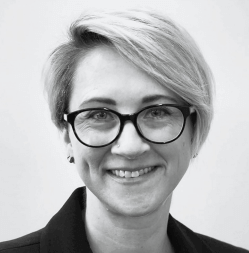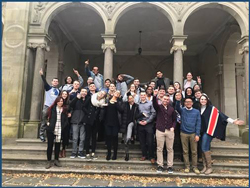The Faculty Association and the Helen Bennett McMurray Endowment for Social Ethics hosted a webinar about the impact of for-profit outsourcing in higher education on Thursday, March 31. The featured guest speaker was Stephanie Hall, Ph.D., senior fellow and teacher education policy expert from The Century Foundation, one of the oldest public policy research institutes in the US.
“The rise of online program management corporations, and the increased outsourcing of university operations to for-profit companies, are among the biggest threats in higher education right now,” said Johanna Foster, Ph.D., associate professor of sociology, president of the Faculty Association of Monmouth University, and Endowed Chair of Social Ethics. “We hosted the educational session because we are really concerned about the ways in which these companies, many of which have been shown to be predatory, have their eye on the prize of student tuition dollars as opposed to the mission of education.”
The event began with a brief appearance from Vin Gopal, a New Jersey State Senator and head of the New Jersey Senate Higher Education Committee. Gopal co-sponsored recent legislation with Senator Sandra Cunningham to look into the regulation of online program managers (OPM) in New Jersey.
“We’ve known that these online program managers are designed to recruit students at high profits,” said Gopal, who described how many colleges sign contracts with OPM’s and give them a share of the college tuition revenue. “It’s of concern, the aggressive recruiting of these students for expensive programs that may not always provide a quality education. The content of these programs often bypass a lot of the school and department’s governance procedures.”
Issues regarding OPM’s have grown more prevalent since the start of the COVID-19 pandemic, with many colleges and universities transitioning to an online modality that can be more easily dominated by OPM’s.
“The bill requires online program managers providing these marketing services for institutions to self identify as third-party to prospective students and really just brings a lot of transparency into the process,” said Gopal, who noted that the bill has not yet acquired sponsors in both houses and therefore cannot be moved until it is introduced by an assembly member.
“It’s a good bill. It’s not controversial, it’s not political, it’s not partisan, and it does the right thing. I think we’re heading in the right direction on this, we just need a little bit of momentum,” Gopal continued.
Hall, whose research served as inspiration for Gopal’s OPM legislation, led the rest of the discussion with a presentation about OPM’s and the outsourcing of academic programs. Her work focuses primarily on bringing more accountability to for-profit colleges and assessing the business arrangements behind online degree programs that utilize OPM services.
During her presentation, Hall noted that OPM’s are less of a problem than the act of outsourcing and the programs that are being outsourced – more specifically, how they are being paid for. Often, this process involves institutions signing six to ten year contracts with automatic renewals that have some sort of tuition-sharing clause and are very difficult to get out of.
“The riskiest but most common form of outsourcing to OPM’s involves the school paying a contractor on a tuition-sharing basis. Rather than contracting with a third party for something you need and agreeing on a price for that service, you are going to the third party and they’ll agree to do the service for you. Instead of paying a big chunk of money for those services, you’re going to pay them over time a share of the revenue that is raised as a result of those programs,” explained Hall, who noted that these companies often engage in “pressurized sale tactics” when they can benefit financially from increased enrollment.
Although institutions assume that outsourcing to OPM’s will save them money and help recruit more students, the benefits are often outweighed by the unforeseen negatives. “The research that Dr. Hall and many others have done shows that these corporate and outsourcing partnerships can actually end up hurting students, who pay extraordinary tuition fees for degrees outsourced to these for-profit companies, often without even fully realizing how much their non-profit university has partnered with the for-profit sector,” explained Foster. “Faculty and campus staff are also at serious risk given that the core of what happens in these deals is that the labor of faculty and staff gets replaced, or at the very least, partially controlled, by outside for-profit vendors who are paid, essentially, by student tuition dollars.”
“While there may be some short term gain for the college and some students, in the long run, this business model really seems to only work for the for-profit entities who get big chunks of student tuition dollars,” she continued.
Although this type of incentive compensation was banned under federal law, a 2011 exception allows colleges to pay their OPM’s on a tuition-sharing basis.
As such, questions arise about who’s actually managing the institution when power is allotted to OPM’s in the recruiting process and in other areas where colleges or universities may require third-party assistance. “Students can go all the way through graduation without knowing that there are third parties involved in their degree program,” noted Hall.
In order to avoid the worst effects of OPM outsourcing, Hall recommends that faculty ask questions and remain involved in the OPM contracting process, avoiding these deals if possible but ensuring that they are reasonable if third-party assistance is truly needed. Beyond the institution, she recommends that policymakers push for transparency requirements and disclosure laws that require recruiters to disclose who they work for.
“It’s really a frightening shift in the university landscape nationwide, and we felt it was critical to arm our community given the extent that the for-profit college model has made such dangerous, and often invisible, in-roads into the traditional non-profit university space in recent years,” said Foster. “We would hate to see a shift like this come to a place like Monmouth, so it was important for us to offer a chance for students, faculty and staff to learn more about these really troubling ethical dilemmas in higher education right now.”




